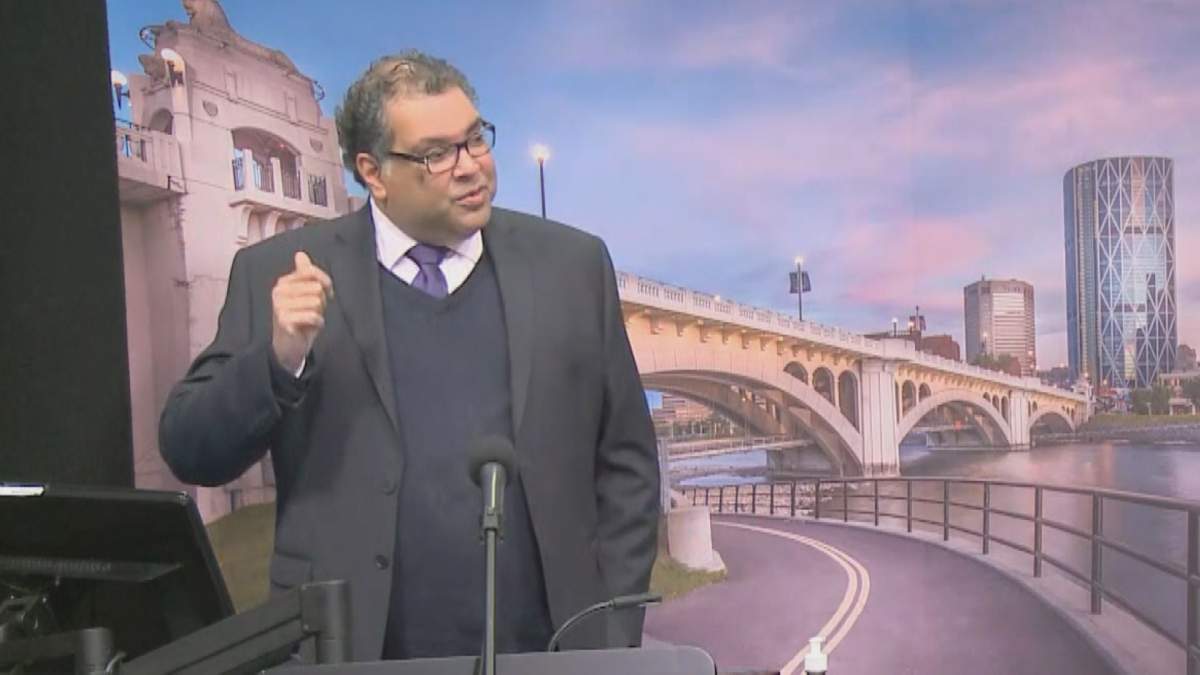Calgary’s latest state of local emergency (SOLE) has been extended for another 90 days, Mayor Naheed Nenshi announced Tuesday.

The SOLE has allowed the city to respond to emerging needs with agility with in the city, in an effort to protect Calgarians’ health and welfare.
“One of the good news pieces about the fact that we’re maintaining the state of local emergency is precisely because it will allow us to do a better job at vaccine distribution,” Nenshi said.
“With vaccines here and many more on the horizon, it’s critical that the city maintain our agility to act as quickly as we can to provide space, to provide facilities, to provide personnel for the provincial government’s vaccination efforts.”
For weeks, the mayor has been offering those resources to Alberta Health Services. But Nenshi said the province hasn’t had a need to tap into the city resources yet.
Sue Henry, chief of the Calgary Emergency Management Agency (CEMA), said she sits on vaccination task forces to make sure CEMA is “positioned to work quickly.”
“As early as yesterday, we had conversations with the province around our offers of facilities,” Henry said. “We’re waiting on a supply issue to understand if and when they will reach out to the cities and municipalities to have us help in that vaccination. And until that point, we are planning and standing ready to assist.”

Henry isn’t sure when the city will be called upon by AHS.
“We are hopeful that as that supply chain continues to ramp up — as soon as they’re at a point where Alberta Health Services feels the need to have additional logistics support to be able to get those vaccines into arms faster — that’s when our network will kick in to assist them,” the CEMA chief said.

Get weekly health news
AHS confirmed to Global News there has been some discussion with the city about potential future involvement in vaccination efforts, but nothing is in place at this time.
According to the Public Health Agency of Canada’s website, Alberta is due to receive more than 69,000 doses of COVID-19 vaccines this week.
The province remains in a state of public health emergency.
Keeping Calgary in a heightened state of readiness for the past six months hasn’t come without cost, the mayor said.
It’s part of the “big” year-end deficit the city faces when combined with the pandemic’s effects on low transit ridership and low rec facility use, he said.
“I’m pleased to report that we’re going to be OK,” Nenshi said Tuesday. “With the extraordinary work that my city colleagues have done to really watch every penny and keep costs incredibly low, even during a state of local emergency where sometimes the wallet is a little more open.”
The mayor credited pandemic funds from the provincial and federal governments with helping ease that fiscal stress.
“And so citizens don’t have to be worried about their taxes going up as a result of all of this. We’ve managed to cover that.”
Nenshi also announced that, thanks to $1.5 million from Ottawa, the city’s business improvement areas will get a boost in the form of covering BIA fees for some 6,000 member businesses at an average of $700 each.
Those federal funds will also go to the city’s ShopHERE initiative — helping establish online shops for small businesses — and Chinook Blast — the city’s nascent winter festival.
City reopening sports facilities
Henry also announced that the Calgary Soccer Centre and ice sheets at the George Blundun and Optimist Arena, the Stew Hendry Arena and Henry Viney Arena will open on Feb. 25.
“We’ve seen a high demand from our sports groups and individuals who are looking to book our facility for one-on-one sports training and for minors for group training in line with the public health orders,” Henry said.

Henry said the facilities cannot be booked for games, swim lessons, registered programs, individual workouts or group exercise.
The CEMA chief said city-run amenities like weight rooms, indoor public skating and public swimming remain closed to follow public health orders. Henry said the decision to reopen them would rely on factors like customer demand, the ability to re-staff and changes in provincial public health orders.
March 1 is the earliest that Step 2 in the province’s “path forward” could happen, and could include broader reopenings of indoor fitness facilities. But if that step is announced on Friday, the city would not be able to ramp-up operations to reopen those fitness facilities on Monday.
“We’ve laid off 15 per cent of our staff over the course of the entire thing, including many of our frontline recreation staff, but they are on callback contracts,” Nenshi said.
“We need to understand what (loosening of restrictions) means before we can plan for the facilities to reopen and the subsequent potential staff impacts to that,” Henry added.












Comments
Want to discuss? Please read our Commenting Policy first.